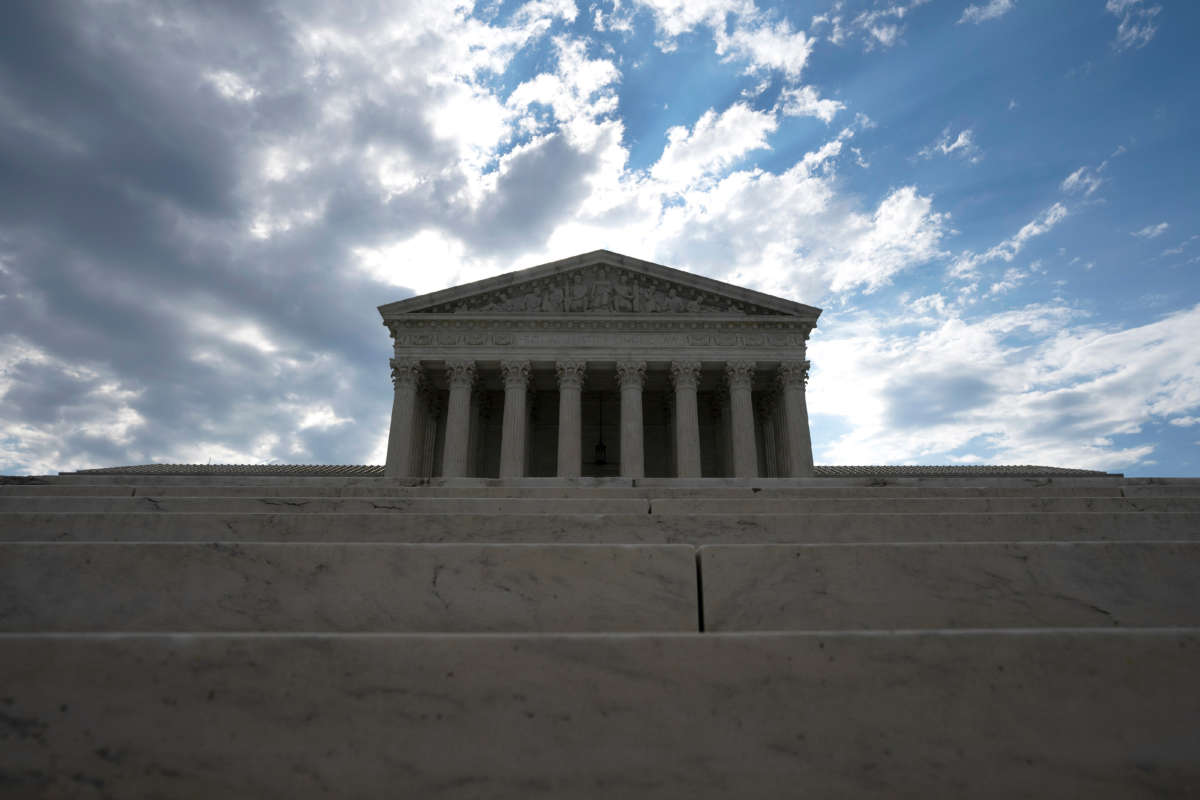Honest, paywall-free news is rare. Please support our boldly independent journalism with a donation of any size.
Early on Tuesday, the United States Department of Justice carried out the execution of a person on death row just hours after the United States Supreme Court issued a narrow ruling refusing to consider a delay.
Daniel Lewis Lee is the first person executed by the federal government since 2003. Lee, who was convicted of killing an Arkansas family in the 1990s, maintained his innocence to the end of his life.
“I didn’t do it,” Lee said in the moments before he was executed. “I’ve made a lot of mistakes in my life, but I’m not a murderer. […] You’re killing an innocent man.”
The 5-4 decision from the Supreme Court fell along partisan lines, with conservative bloc members voting to allow the execution to move forward and liberal justices arguing against doing so.
A dissent from Justice Stephen Breyer questioned the legality of the death penalty itself.
“The resumption of federal executions promises to provide examples that illustrate the difficulties of administering the death penalty consistent with the Constitution,” Breyer wrote.
In a separate dissent, Justice Sonia Sotomayor noted the finality of the death penalty, and how hasty executions made it impossible for those who were convicted to appeal or prove their innocence, or even argue against the specific practice of lethal injection as a means to carry out their sentences.
“Today’s decision illustrates just how grave the consequences of such accelerated decision making can be,” Sotomayor wrote in her early morning dissent. “The court forever deprives respondents of their ability to press a constitutional challenge to their lethal injections, and prevents lower courts from reviewing that challenge.”
Since the Supreme Court ruled in 1976 to allow the resumption of federal executions, only three individuals have been put to death. Still, some studies have noted that, statistically speaking, 4.1 percent of those put to death are likely innocent. Additionally, more than 2,600 death row inmates have been exonerated since 1989, demonstrating serious problems involved with adjudicating, which showcases the possibility that an errant conviction can lead to an execution.
Among those who opposed the speedy execution of Lee were the family members of his alleged victims. They sued on Monday to delay the process, arguing that the coronavirus pandemic curtailed their right to witness the execution firsthand, and asked for it to be delayed until after the health crisis had ended. In fact, the alleged victims’ family members had expressed that they hoped there would never be an execution.
Several anti-death penalty activists spoke out on Tuesday morning after Lee was executed, arguing against the practice on social media.
Vanita Gupta, president and CEO of The Leadership Conference on Civil and Human Rights, and a former head of the Department of Justice’s Civil Rights division, derided the “middle of the night, middle of a pandemic decision.”
“The death penalty is always wrong but right now a priority apparently for USDOJ,” she added.
A middle of the night, middle of a pandemic decision. The last execution of a person in federal custody was 2003. The death penalty is always wrong but right now a priority apparently for USDOJ. https://t.co/MzeWrEMzbS
— Vanita Gupta (@vanitaguptaCR) July 14, 2020
Michael Bromwich, a former DOJ Inspector General, agreed.
“Anyone who still supports the death penalty hasn’t been paying attention for the past 30 years,” he said in a tweet, noting that the “criminal justice system is riddled with errors and discrimination.” Adding, “Whether or not it’s constitutional, it’s wrong.”
Sister Helen Prejean, a longtime advocate for the abolishment of the death penalty in the United States, criticized the practice in a tweet on Monday night, prior to the Supreme Court’s decision and Lee’s execution.
“The government cannot be trusted with the power to kill our fellow citizens. The death penalty is a failed public policy rife with racism, abuse, and errors,” she said. “Abolish this immoral practice now.”
Author Clint Smith noted on Tuesday morning the several problems associated with the death penalty as well.
We must repeat it again and again. The death penalty is immoral. It is ineffective. It is expensive. It is cruel. It is laden with racism. It is full of mistakes. It is wrong. Nothing is made better by the government injecting someone with poison in our name. That is not justice.
— Clint Smith (@ClintSmithIII) July 14, 2020
“We must repeat it again and again,” he wrote. “The death penalty is immoral. It is ineffective. It is expensive. It is cruel. It is laden with racism. It is full of mistakes. It is wrong.”
“Nothing is made better by the government injecting someone with poison in our name,” he added. “That is not justice.”
The DOJ has scheduled at least two more federal executions to happen later this week.
A terrifying moment. We appeal for your support.
In the last weeks, we have witnessed an authoritarian assault on communities in Minnesota and across the nation.
The need for truthful, grassroots reporting is urgent at this cataclysmic historical moment. Yet, Trump-aligned billionaires and other allies have taken over many legacy media outlets — the culmination of a decades-long campaign to place control of the narrative into the hands of the political right.
We refuse to let Trump’s blatant propaganda machine go unchecked. Untethered to corporate ownership or advertisers, Truthout remains fearless in our reporting and our determination to use journalism as a tool for justice.
But we need your help just to fund our basic expenses. Over 80 percent of Truthout’s funding comes from small individual donations from our community of readers, and over a third of our total budget is supported by recurring monthly donors.
Truthout has launched a fundraiser, and we have a goal to add 273 new monthly donors in the next 72 hours. Whether you can make a small monthly donation or a larger one-time gift, Truthout only works with your support.
